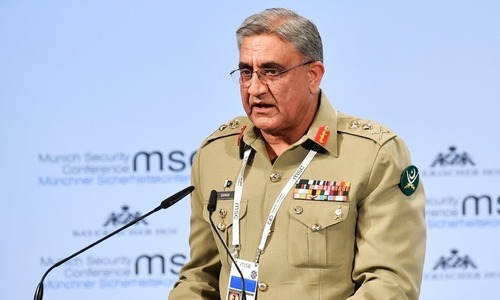THE Islamabad Security Dialogue that coincided with US Defence Secretary Lloyd Austin’s India visit, where he praised New Delhi’s growing ties with ‘like-minded partners’, saw Pakistan’s leadership attempting to allay US fears about growing Chinese influence in the region.
Speaking on the second day of the dialogue, army chief Gen Qamar Javed Bajwa talked about CPEC in terms of an opportunity for economic cooperation for the whole region including India and offered an olive branch to Pakistan’s eastern neighbour.
Following on from Prime Minister Imran Khan, who spoke a day earlier, he did not mention or decry New Delhi’s unilateral annexation of India-held Kashmir by abrogating Article 370 of the Indian constitution which accorded special status to Kashmir due to its status as a disputed territory.
Gen Bajwa said his country was keen to ‘bury the past’ and move forward. Although Mr Khan and Gen Bajwa did say Kashmir, along with all bilateral issues, needed to be addressed for lasting peace and prosperity in the region, the acrimonious language of recent months was conspicuous by its absence.
It is apparent what sort of challenges the authors of Pakistan’s national security policy will face in the coming months.
It was clear who this message was being pitched at as multilateral economic relations were being mentioned, suggesting fears about Pakistan being tied to China alone were misplaced. The army chief mentioned how his country had seen the need to “set our own house in order” and taken action to contain and eliminate terrorism.
It would be safe to say that the Khan-Bajwa statements did not come out of the blue. Very little is known about it but there has been some backdoor diplomacy, well out of the public eye, that led to the Pakistani and Indian DGMOs discussing and agreeing to a ceasefire along the LoC in Kashmir.
That will contribute to lowering temperatures along the LoC and also bring respite to Kashmiris living in proximity to it, whose lives have been shattered for many months now as mortars and rocket fire were being exchanged frequently, claiming lives, limbs and property.
With the outlines of the Biden administration’s foreign policy goals in the region emerging rather clearly now, it is apparent what sort of challenges Pakistan’s national security policy authors will face in the coming months and how much elbow room they might have.
For example, look at what wire services reported Pentagon spokesman John Kirby as saying: Austin “commended India’s leadership role in the Indo-Pacific and growing engagement with like-minded partners across the region to promote shared goals”.
“The two sides reaffirmed their commitment to promote a free and open regional order. Both sides exchanged perspectives on shared challenges confronting the region and committed to further strengthen their broad-ranging and robust defence cooperation,” Kirby said.
With the state of the economy the way it is as we speak, it won’t be too profound to say that elbow room will be exceedingly limited and, unless the economy picks up, the country will lurch from one crisis to another.
The effort, if fruitful, towards some peace in Afghanistan and lessened tension with India may improve the external threat environment for Pakistan but a simultaneous effort to restore a semblance of internal stability to the country is an equal imperative.
For their part, the government and its backers do not seem inclined at this point to want this as their actions and rhetoric in the public domain suggest. For any foreign policy to be effective it will be important that there exists a demonstrable political consensus within the country.
And in the current domestic political climate, a consensus even in key areas seems unlikely unless all the players are prepared to meet the others halfway; not cemented in their positions and bunkered down behind a wall of self-righteousness.
Even as so many see a South Africa-type truth and reconciliation process as a great way to move forward, not one individual in the country expects to see it happen because the kind of heart and moral authority Nelson Mandela enjoyed will be impossible to find here.
In an environment where nobody, yes nobody, is prepared to sacrifice even a modicum of personal/institutional power, despite the Constitution apportioning authority between offices and institutions unambiguously, truth and reconciliation of that sort seems out of the question.
And yet that seems to be the only way forward. Take the example of former prime minister Nawaz Sharif. He was castigated, some would argue deposed and sent to prison eventually, for suggesting the sort of putting ‘our house in order’ in 2016 that is being mentioned as a success in 2021.
He may want an explanation before endorsing a foreign and national security policy — particularly if such policies warrant international commitments as well — why what was deemed unacceptable five years ago and likened to treason, is now something to celebrate.
Internal cohesion and harmony are essential for the country’s economic prosperity and would contribute in no uncertain terms to its national security. The army chief has also linked economic well-being to national security.
The Islamabad Security Dialogue initiated by the National Security Division included government-funded think tanks. The domestic and, more significantly, the international audience may have heard the message as it seemed loud and clear.
In the second phase, hopefully, a more meaningful dialogue can be organised cutting across the political divide for, it is assumed, today’s opposition is tomorrow’s government. A policy that represents a broader consensus over key areas is well placed to survive the test of time and work.
The US is looking at India to contain the spread of China’s influence in the region. Pakistan needs to assess the impact of this ‘alliance’ on its interests and chart a future course accordingly. Restoration of internal harmony by respecting popular will and the Constitution appear to be sensible starting points.
The writer is a former editor of Dawn.
Published in Dawn, March 21st, 2021















































